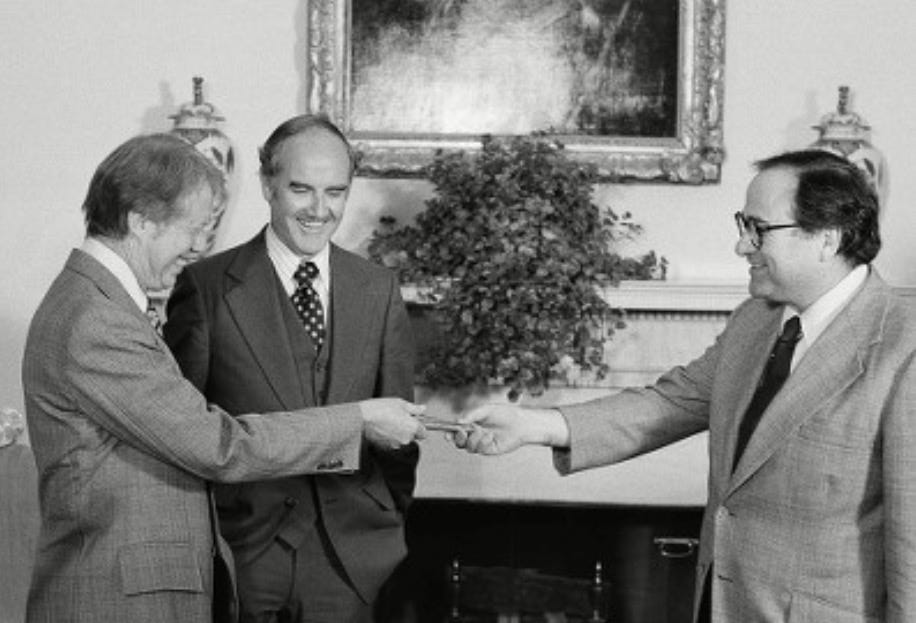
James Abourezk, a former senator who was a staunch supporter of tribes and shepherded the passage of the Indian Child Welfare Act, died last week on Feb. 24, his 92nd birthday.
Abourezk, the first Arab American to serve in the U.S. Senate, represented South Dakota in both houses of Congress in the 1970s. Having grown up on the Rosebud Indian Reservation, where his parents had landed after immigrating from Lebanon, he was an early champion of Indigenous rights and sponsored ICWA and other laws that reshaped the federal government’s tribal relations.
During the early years of Abourezk’s tenure in the Senate, the Association on American Indian Affairs released the results of a 5-year study that found as many as one-third of Native children were being taken into foster care, nearly all of them being placed with non-Native foster or adoptive families, permanently severed from their tribal communities.
“Those kids were my playmates,” Abourezk told The Imprint in 2018. “A friend helped me see that that was my responsibility. We have an obligation to do right by them.”
The late congressman — who was described by colleagues as courageous, outspoken and funny — was arguably a catalyst for getting Native issues on the minds of federal lawmakers following the transformational civil rights movement and amid growing turbulence and activism around Indigenous rights.
Abourezk pushed for the creation of and co-chaired the American Indian Policy Review Commission, which conducted an in-depth analysis of federal law regarding tribes, with the express purpose of soliciting recommendations to improve tribes’ self-determination and participation in making the policies that impact them.
The commission collected testimony from more than 90 tribes and heard 28 days of hearings before releasing a final report in 1976, which covered a range of issues from hunting and fishing laws to child custody rights.
The findings of this report, along with the data revealing the alarming number of children being taken from their families, paved the way for the ICWA’s 1978 passage.
As chair of the newly created Senate Committee on Indian Affairs, Abourezk presided over ICWA hearings, where Indigenous activists, social workers and parents who had lost children testified to the irreparable generational trauma caused by federal child welfare policy in tribal communities.
The landmark legislation — aimed at reducing the number of Native children separated from their families through foster care and keeping Native foster youth in tribal homes — faced enormous opposition, including by the Bureau of Indian Affairs. It passed at the 11th hour, just as the 95th Congress was coming to a close on October 24, 1978 — only months before Abourezk retired from office.
The commission sparked several other reforms, including Abourezk’s American Indian Religious Freedom Act and the Indian Self-Determination and Education Assistance Act, which he co-sponsored, that allowed tribes to receive and administer federal grants for education and social programs.
Ultimately, at least six of Abourezk’s bills relating to tribal sovereignty would become law in his eight years in Congress. He also took his commitment to tribal advocacy beyond the Senate chambers, traveling to Wounded Knee to negotiate between law enforcement and activists from the American Indian Movement who, in the late 60s and 70s, occupied that and other historic sites in protest of the federal government’s treatment of tribes.
Abourezk left the Senate in 1979, deciding not to run for reelection. He focused on advocating for civil rights for Arab Americans, creating the American-Arab Anti-Discrimination Committee. His work in this realm was not without controversy: In 2007, he told a Hezbollah-backed TV news station that Zionists had helped orchestrate the 9/11 attacks as a plot to sow Islamophobia, and that Zionists controlled the U.S. Congress.
He also continued to advocate for Native rights, and spoke out against lawsuits seeking to have ICWA overturned.
Abourezk was interviewed by The Imprint in 2018, just as the current threat to his landmark legislation was ballooning into national concern. In the midst of a district judge deeming ICWA unconstitutional in the Brackeen v. Haaland case — then called Brackeen v. Zinke, named for the Interior Secretary at that time — Abourezk spoke to the measured improvements the bedrock law had created for the nation’s first people. The case is now being decided by the Supreme Court.
“There’s still a lot of suffering on reservations, and mean treatment by governments,” he said, “but it’s been cut down by ICWA.”
**👇
Indian Child Welfare Act Think Tank to Strategize Legal Protections for Tribal Sovereignty
With the fate of the Indian Child Welfare Act in the Supreme Court’s
hands, a new think tank has formed to advance legal and political
strategies to protect tribal sovereignty.






















No comments:
Post a Comment
Please: Share your reaction, your thoughts, and your opinions. Be passionate, be unapologetic. Offensive remarks will not be published. We are getting more and more spam. Comments will be monitored.
Use the comment form at the bottom of this website which is private and sent direct to Trace.